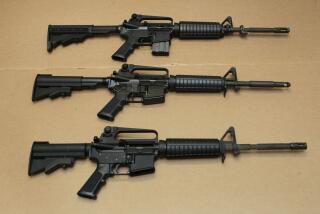Chinese Gun Dealer Is Global, Diversified Giant
- Share via
BEIJING — The small bookshop behind a row of makeshift fruit stalls is a gun lover’s paradise.
For pocket change, customers can buy glossy color photo albums and postcards of assorted automatic weapons--Israeli Uzis, Italian Berettas, Russian Kalashnikovs. One postcard shows a man in an FBI cap gripping a 100-round Calico machine pistol made in Bakersfield.
More intense arms fanciers can peruse technical books such as “How to Use Lasers in Weapons Technology” and “Guide to Weapons Industry Projects Preparatory Work & Investment Management.”
The bookstore and the building that houses it in the university district of the Chinese capital are owned by China North Industries Corp., or Norinco, the country’s biggest state-owned military industrial company.
Overseas agents for Norinco were among those arrested in a federal sting operation in Northern California this week. They are accused of smuggling 2,000 Chinese AK-47 assault rifles, with a street value of $4 million, into the United States.
In effect, the bookstore in northwest Beijing is a resource library for one of the world’s most successful international small-arms merchants. For two decades, Norinco and two other Chinese military-linked companies--Poly Technologies, owned by the People’s Liberation Army, and China Jingan, controlled by the People’s Armed Police--have dominated global small-arms traffic.
During the bloody Iran-Iraq War, the Chinese companies profited by selling to both sides. After the Soviet invasion of Afghanistan, the companies sold AK-47 rifles to the CIA, which distributed them through Pakistan to the Afghan moujahedeen warriors fighting the northern invaders.
When that war subsided, the three companies moved into the market created by the ballistic mayhem of American streets, selling primarily semiautomatic versions of the AK-47 and low-cost handguns modeled on more famous brands. Norinco joined Colt and Smith & Wesson on police logs across the country.
From 1989 through 1993, it is estimated, the Chinese military companies exported more than 3 million guns into the United States. In a 1993 interview with the Far Eastern Economic Review, Poly Technologies Executive Director Xie Datong estimated that the company sold $200 million in weapons in the United States in a five-year period.
The boom years ended abruptly in 1994, when President Clinton banned the import of Chinese guns and ammunition manufactured by military businesses. But Clinton then granted China a much bigger prize: the “delinking” of human rights considerations from the annual review of China’s most-favored-nation trading status with the United States.
Much pleased with the outcome on MFN, the Chinese government only mildly protested the weapons sanctions. But the ban deeply wounded one of the main profit sources of the three primary Chinese companies involved.
In the case of Norinco, weapons manufacturing accounts for only about 20% of the company’s total production value. Formed under the China Ordinance Corp. as the principle arms supplier to the PLA, Norinco began branching out into civilian businesses in the 1980s.
Today it is the parent company of 150 businesses. Among other things, Norinco is the largest motorcycle maker in China and one of the country’s most successful car makers. Other products include everything from toilet seats to basketballs to eyeglasses. Norinco is China’s 10th-biggest trading house.
But gun sales, particularly to the United States, was one of Norinco’s most profitable businesses. Moreover, certain regional factories depended on the gun trade for survival.
In the case of Poly Technologies--which employs relatives of some of China’s most senior officials, including the son-in-law of Chinese patriarch Deng Xiaoping--the U.S. ban cut off an important source of revenue for the Chinese military, which operates a widespread network of capitalist enterprises to supplement its state budget.
According to sources involved in the arms trading business with China, it was the sudden elimination of the United States as the biggest market for Chinese small arms in 1994 that created an atmosphere in which smuggling weapons into the U.S. became a dangerous possibility.
“There were a lot of factories out there in China that suddenly had nothing to do,” said an American businessman in Beijing with experience in the China-U.S. small-arms trade. “I can see a renegade manager of a renegade provincial branch of Norinco coming up with the idea as an act of desperation.”
Both Norinco and Poly Technologies have denied any involvement in the alleged smuggling. “As far as we know, Norinco has nothing to do with this matter,” said a Norinco official in Beijing.
The Chinese government has said it is looking into the affair.
It was not the first time federal agents in the United States have cracked down on smuggling involving Chinese-made weapons.
In a similar sting operation in 1991, federal agents arrested the son of a billionaire member of China’s Parliament for conspiring to bring 15,000 AK-47 automatic weapons into the United States.
Thomas Fok, a Hong Kong native and son of a tycoon with close ties to China’s leadership, Henry Fok, was also charged with trying to obtain U.S. missile technology for China. In a plea bargain, Fok pleaded guilty and spent less than six months in jail.
The current case is much smaller.
“A lousy 2,000 AK-47s,” said an American arms dealer in Beijing. “Hell, you could soak that up in four blocks of New York City. For Norinco, its peanuts.”
Times staff writer Maggie Farley in Hong Kong contributed to this report.
More to Read
Inside the business of entertainment
The Wide Shot brings you news, analysis and insights on everything from streaming wars to production — and what it all means for the future.
You may occasionally receive promotional content from the Los Angeles Times.










